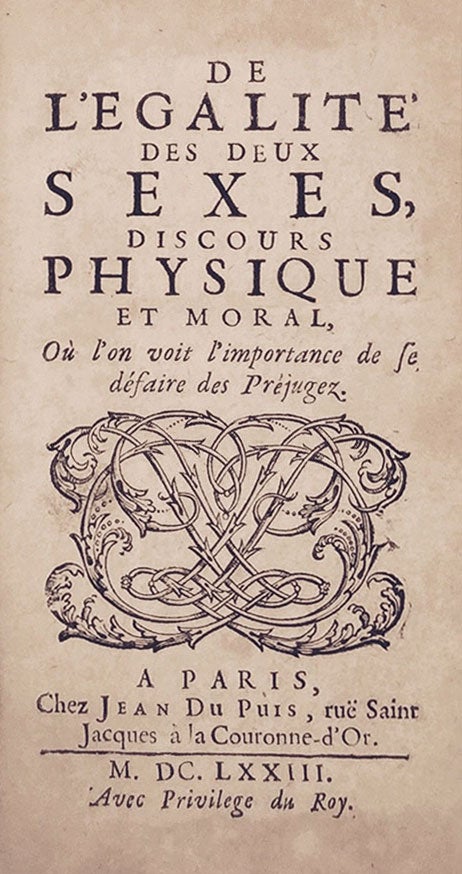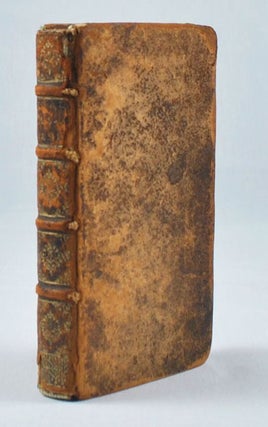De L’Égalité des Deux Sexes, Discours Physique et Moral, où l’on voit l’importance de se défaire des Préjugez.
Paris: Jean de Puis, 1673. Full original calf, gilt spine. [16], 243, [5] pp. First edition of this essential book in the history of feminism, a turning point of feminist argumentation and philosophy. François Poulain [Poullain] de la Barre (b. 1647 in Paris) rejected the dogmatic reasoning style of his scholastic education in writing this foundational feminist text. It is the first of three works, published in succession between 1673 and 1675, in which he makes an argument for the equality of the sexes. De l'Égalité des Deux Sexes was followed by De l'éducation des dames pour la conduite de l'esprit, dans les sciences et dans les moeurs: Entretiens (1674). The trio concludes with De l'excellence des hommes, contre l'égalité des sexes (1675) in which Poulain responds to and refutes his own counterarguments to gender equality. While other feminist writers before him called upon religious and philosophical authorities, Poulain was the first to base his argument on reason alone. “Poulain borrowed from Cartesians of the 1670s the idea that many common beliefs are ‘prejudices’, i.e., ‘judgements made about things without having examined them’” (Clarke, François Poulain de la Barre in the Stanford Encyclopedia of Philosophy). In this sense, l’Égalité can be seen not only as a turning point in feminist thought and argumentation, but also one of the first truly philosophical feminist works. Albistur and Armogathe, much cited scholars of the history of feminism, locate Poulain’s involvement with Cartesianism as a catalyst in feminism: “Without Descartes there would not have been Poullain de la Barre; without Poullain de la Barre, the history of feminism would have gone nowhere for a long time. Undeniably, he must be considered the theoretician for women's emancipation, the most important that we had from the Middle Ages to the middle of the nineteenth century” (Histoire du féminisme français, p. 84, as translated in Three Cartesian Feminist Treatises, fn. 104, p. 33). After its translation in 1677 as The Woman as Good as the Man, Poulain’s work became influential in England, where it was widely and enthusiastically plagiarized throughout the eighteenth and nineteenth centuries. “Poulain changed the focus of the debate about women in the seventeenth century… He challenged the factual claims on which opponents of sexual equality relied, rejected the value of appealing to women's nature as if it were something that could be known independently of the properties that were predicated of it, and rejected as invalid any inference from established customs (as mere facts) to a moral or political justification of women's status… Poulain may be described as the first Cartesian feminist” (Clarke). Particularly fascinating about this book is the way in which the Cartesian doubt that Poulain employs to dispel traditional arguments in favor of gender inequality also has the potential to undermine his own work. In fact, that doubt confirms the book’s philosophical credibility while also making room for further advancements in feminist thought. Simone de Beauvoir makes Poulain’s words the epigraph of The Second Sex: “Everything that men have written about women should be viewed with suspicion, because they are both judge and party.” By using his weakness to strengthen her own credibility, Beauvoir brings Poulain’s influence directly to the 20th Century and clinches his place as a canonical figure in feminist philosophy. An important argument for the equality of the sexes, marking a transition from early modern to modern feminist philosophy. CONDITION: Good, rubbed with small losses at head and foot of spine, upper joint split but cords holding firm.
Item #3536
Price: $3,500.00



